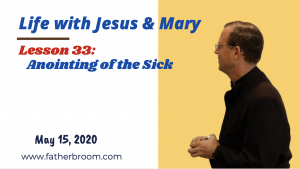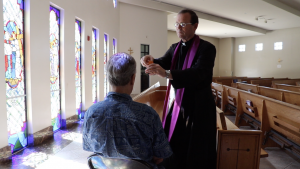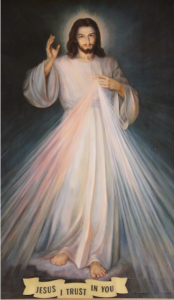
Lesson 33: Anointing of the Sick
1. What are the two Sacraments of Healing?
The two Sacraments of Healing are Anointing of the Sick and Confession.
2. What Scripture passage speaks of Anointing of the Sick?
Anointing of the Sick is referred to in the Epistle of St James: “Is any among you sick? Let him call for the presbyters of the Church, and let them pray over him, anointing him with oil in the name o the Lord; and the pray of faith will save the sick man, and the Lord will raise him up; and if he has committed sins, he will be forgiven” (James 5:14-15)

3. Who is the minister of Anointing of the Sick?
The minister of Anointing of the Sick is a Bishop or a Priest.
4. Who is able to receive Anointing of the Sick?
Anyone, who has arrived at the age of reason and who is beginning to be in danger of death because of sickness or old age can receive Anointing of the sick.
- Thus, infants who are in danger of death may not be given Anointing of the Sick. They may receive only Baptism and Confirmation.
- Yung healthy people who have illnesses, like a cold, that do not endanger their lives may not receive Anointing of the sick.
- A person who is healthy but elderly may receive Anointing of the Sick.
5. How is Anointing of the Sick administered?
Anointing of the Sick is administered in the following way.
- The Word of God is proclaimed and prayer is made with faith.
- A priest or bishop lays his hands on the person’s head in silence. The laying on of hands is a symbol of the conferring of the Holy Spirit.
- The priest then anoints the person with blessed oil, while saying a prayer. Oil is a symbol of joy, healing, and strength. The Bishop blessed the oil on Holy Thursday morning during the Chrism Mass.
6. Besides an increase of Sanctifying Grace, what are the effects of Anointing of the Sick?
Anointing of the Sick gives a particular gift of the Holy Spirit
- The first grace is the gift of strength, peace, and courage to overcome the difficulties that are associated with serious illness or old age. This grace renews trust in God and strengthens the person against the temptations to discouragement and anguish that often accompany death.
- The person also receives the gift of uniting himself more closely to Christ’s Passion, allowing him to work for the salvation of souls and the good of the Church.
- Anointing of the Sick is also able to heal people physically, if this would be for their spiritual good.
- It also removes sin. It can remove mortal sin of the person is unconscious, and had been sorry for his mortal sins before becoming unconscious.
7. What are the last three sacraments that we want to receive?
The last sacraments that we want to receive before dying are: 1) Confession; 2) Anointing of the Sick; and 3) the Eucharist. These three Sacraments are called “the Sacraments that prepare us for our heavenly homeland.” (CCC #1525) The Eucharist at the end of our life is called Viaticum. Jesus said, “He who eats my flesh and drinks my blood has eternal life and I will raise him up on the last day.” (John 6:54)
8. If we are in danger of death do we have an obligation t receive the Eucharist?
If we are beginning to be in danger of death because of illness or old age we have a serious obligation to receive the Eucharist, as Viaticum.
If a Catholic is ding we have a serious obligation to call a priest to his or her bedside. When we call a Priest, we are really calling Christ; since it is Christ who confers the sacraments through the Priest.
THE CHAPLET OF DIVINE MERCY

On September 13, 1935 St Faustina saw an angel about to punish the world for its many sins. St Faustina began to beg God to have mercy on the world with a prayer that God inspired in her heart. This prayer that Our Lord gave her was the Chaplet of Divine Mercy. As she prayed in this way, she saw the Angel’s helplessness. He could no longer carry out his just punishment. Instead of punishing the world God blessed the world with his mercy.
The following are some of the promises that Our Lord attached to the recitation of the Chaplet of Divine Mercy: “Say unceasingly this chaplet that I have taught you. Anyone who says it will receive great Mercy at the hour of death. Priests will recommend it to sinners as their last hope. Even the most hardened sinner, if he recites this Chaplet even once, will receive grace from y Infinite Mercy… When they say this Chaplet in the presence of the dying, I will stand between My Father and the dying person not as the Just Judge but as the Merciful Savior.”
St Faustina experienced on different occasions that Jesus was faithful to his promise. She wrote in her Diary: “When I entered the chapel for a moment, the Lord said to me, ‘My daughter, help Me to save a certain dying sinner. Say the chaplet that I have taught you for him.” When I began to say the chaplet, I saw the man dying in the midst of terrible torment and struggle. His Guardian Angel was defending him, but he was, as it were, powerless against the enormity of the soul’s misery. A multitude of devils was waiting for the soul. But while I was saying the chaplet, I saw Jesus just as He is depicted in the image. The rays, which issued from Jesus’ heart, enveloped the sick man, and the powers of darkness fled in panic. The sick man peacefully breathed his last. When I came to myself, I understood how very important the chaplet was for the dying.”
On another occasion she wrote: “Today, the Lord came to me and said, ‘My daughter, help Me to save souls. You will go to a dying sinner, and you will continue to recite the chaplet, and in this way, you will obtain for him trust in my mercy, for he is already in despair.” Suddenly, I found myself in a strange cottage where an elderly man was dying amidst great torments. All about the bed was a multitude of demons and the family, who were crying. When I began to pray, the spirits of darkness fled, with hissing and threats direct at me. The soul became calm and, filled with trust, rested in the Lord. At the same moment, I found myself again in my own room. How this happens… I do not know.”
After having assisted another person at the hour of death through the chaplet she wrote: “When I entered my solitude, I heard these words; ‘At the hour of their death, I defend as My own glory every soul that will say this chaplet; or when others say it for a dying person, the indulgence is the same. When this chaplet is said by the bedside of a dying person… unfathomable mercy envelops the soul.’ Oh, if only everyone realized how great the Lord’s mercy is and how much we all need that mercy, especially at that crucial hour (of our death)”